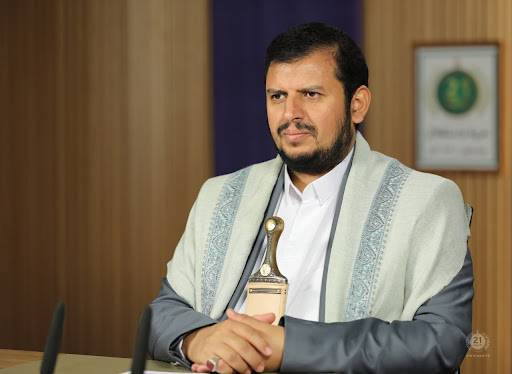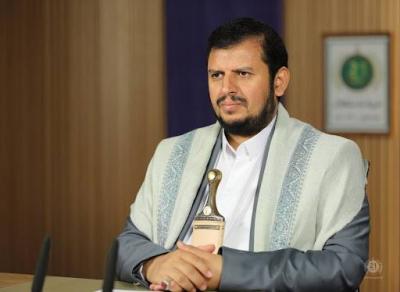Abdul-Malik al-Houthi, the enigmatic leader of the Houthi fighters in Yemen, whose attacks on ships in the Red Sea have led to military responses from the U.S. and British forces, has created a force that defies global powers with irregular fighters wearing sandals. Several shipping companies have suspended their operations or rerouted their routes around Africa due to the Houthi campaign, which has seen the group take control of most of Yemen after overcoming severe difficulties in the war against legitimate forces. The Iran-aligned movement has pledged to continue pressuring global shipping, a development that could negatively impact the world economy until Israel halts its bombing of the Gaza Strip. Israel claims its airstrikes aim to eliminate the Islamic Resistance Movement (Hamas), which is also aligned with Iran. The Houthis have vowed to retaliate after U.S. and British warplanes and naval forces launched attacks across Yemen in response to the assaults on ships in the Red Sea, marking an escalation in the regional conflict linked to the war in Gaza. Some analysts suggest that this development could undermine the hard-won gains the Houthis had achieved domestically. Tobias Burke, a Middle East security expert at the Royal United Services Institute in Britain, noted, "They have managed to survive over the past eight years and strengthen their power, but now they are facing airstrikes from the strongest military in the world."
Al-Houthi has gained a reputation as a strong leader on the battlefield before becoming the head of the Houthi movement, whose fighters in the mountains have been battling an Arab military coalition since 2015 in a conflict that has claimed tens of thousands of lives, destroyed Yemen's economy, and left millions starving. Under al-Houthi’s direction, who is in his forties, the group has enlisted tens of thousands of fighters and amassed a huge arsenal of drones and ballistic missiles. The movement has repeatedly used this arsenal to strike Saudi Arabia's strategic infrastructure, despite years of bombing their own territory. In January 2022, the Houthis escalated the risks with a missile attack on the UAE, a tourist and commercial hub in the Gulf, which is a key U.S. ally like Saudi Arabia. Ludovico Carlino, senior analyst for Middle East and North Africa affairs at H.I.S. Country Risk, stated, "Al-Houthi has transformed a rural militia primarily engaged in guerrilla tactics into one of the most flexible non-state armed groups in the region."
In a 2022 speech, al-Houthi stated his goal is to be capable of striking any target in Saudi Arabia or the UAE, both major oil producers in OPEC, and considered significant security threats to the Middle East and beyond. A shroud of mystery surrounds the leader; it is known that he rarely stays in one place for long, never meets with the media, and is very hesitant to appear publicly at predetermined times. Since the onset of the Yemen war, widely viewed as a proxy conflict between Saudi Arabia and Iran, al-Houthi has never met with foreign officials who have dealt with him, according to an informed source. Many seeking an audience with him have had to travel to the Houthi stronghold in Sana'a, where a Houthi security convoy takes them to safe houses to undergo security checks before being led to a room upstairs where he only appears on a video screen.
The Houthi movement was formed to fight for the interests of Zaydi Shia, a minority sect that ruled a kingdom in Yemen for a thousand years until 1962, but felt increasingly threatened under Ali Abdullah Saleh’s regime from 1990 to 2012. Iranian support for the Houthis, who forced the internationally recognized Yemeni government into exile in 2021, has allowed Tehran to expand its regional network of proxies, which includes Hezbollah in Lebanon and armed groups in Iraq and Syria. Yemen experts assert that the Houthis are primarily driven by a local agenda, even though they have a political convergence with Iran and Hezbollah. The Houthis deny being puppets of Tehran, asserting that they are fighting a corrupt regime and a regional enemy.
The Houthis are part of a regional "Resistance Axis" allied with Iran, which consists of groups aligned with Tehran. The movement adopts elements of Tehran's revolutionary ideology. Like other parties in Yemeni politics, the Houthis operate in a landscape of shifting alliances. In late 2017, they assassinated former President Ali Abdullah Saleh in an RPG ambush after he changed his stance in favor of the Arab coalition. They established a military state to tighten their grip. Analyst Carlino noted, "The Houthis also rely on a brutally oppressive internal security apparatus that suppresses any form of dissent." In recorded speeches, al-Houthi, who claims descent from the Prophet Muhammad, asserts that his movement is under complete siege due to its faith. In one of his speeches, he emphasized the need to focus on preserving Islamic identity and denounced what he called a "soft war" that aims to control the nation in various domains.




